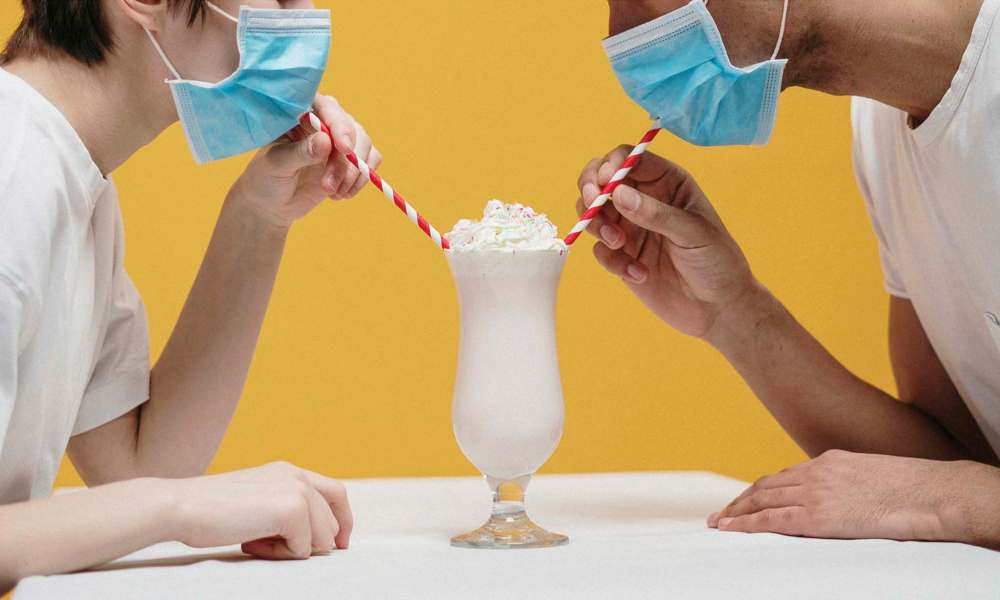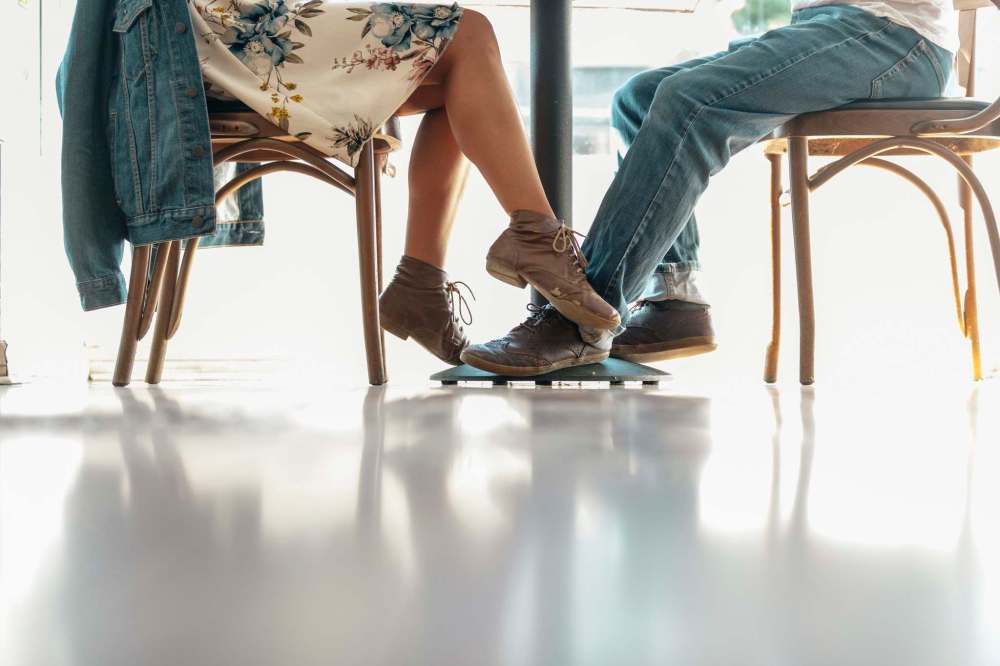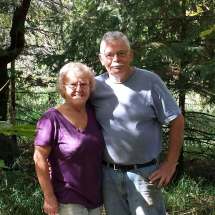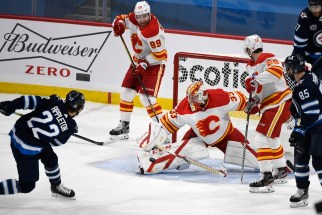Dating at a distance 'Do you have protection?' has taken on new meaning during the pandemic, as single people struggle to balance health concerns with need for human connection
Read this article for free:
or
Already have an account? Log in here »
To continue reading, please subscribe:
Monthly Digital Subscription
$0 for the first 4 weeks*
- Enjoy unlimited reading on winnipegfreepress.com
- Read the E-Edition, our digital replica newspaper
- Access News Break, our award-winning app
- Play interactive puzzles
*No charge for 4 weeks then price increases to the regular rate of $19.00 plus GST every four weeks. Offer available to new and qualified returning subscribers only. Cancel any time.
Monthly Digital Subscription
$4.75/week*
- Enjoy unlimited reading on winnipegfreepress.com
- Read the E-Edition, our digital replica newspaper
- Access News Break, our award-winning app
- Play interactive puzzles
*Billed as $19 plus GST every four weeks. Cancel any time.
To continue reading, please subscribe:
Add Free Press access to your Brandon Sun subscription for only an additional
$1 for the first 4 weeks*
*Your next subscription payment will increase by $1.00 and you will be charged $16.99 plus GST for four weeks. After four weeks, your payment will increase to $23.99 plus GST every four weeks.
Read unlimited articles for free today:
or
Already have an account? Log in here »
Hey there, time traveller!
This article was published 26/03/2021 (1716 days ago), so information in it may no longer be current.
Early on in the pandemic, when “now is the time to stay home,” Jessica decided to go on a FaceTime date with a Tinder match — mostly just for fun.
“There was a specific time; I poured myself a glass of wine,” recalls the 39-year-old Winnipegger over Zoom.
And then she waited. She waited some more. Then she texted him.
“I was like, ‘So, you’re gonna call me?’ and he was like, ‘Oh, no, I’m actually watching Captain America and the room is too dark so I can’t call you.’”
One could make a sound argument that dating has always been a minefield. (Case in point: before COVID-19 was on our radar, Jessica went on one of worst dates of her life. “We sat down, and he was like, ‘All right, I’m gonna be honest, I don’t remember your name.’”)
But over the past year, those who are single or single-and-looking — for everything from a long-term partner to a casual hookup — have had to navigate a whole new world with all new rules.
Some have stopped dating entirely and are waiting out the pandemic until there’s a vaccine; others are trying to reconcile fulfilling their own emotional and physical needs with following public health orders. Social distancing, masking, limiting contacts, staying home: the “fundamentals” don’t exactly allow for new intimacy.
But when Manitoba entered code red, the most restrictive level of pandemic response, in November and remained there, dating became even harder to navigate. It’s telling that most of the people who participated in this article wanted to remain anonymous or be referred to by their first name only, like Jessica. To be single and dating during code-red restrictions means that sometimes rules will be broken, especially since many of the rules were designed with families — or, at least, co-habitating couples — in mind. More casual arrangements have been subject to judgment.

Other regions have at least acknowledged that, yes, people are still going to date and hook up during this time. Last June, the New York City health department guidelines about sex and COVID-19 went viral — mostly for the tip that “you are your safest sex partner.” But the advice was useful and non-judgmental.
Last May, public health officials in the Netherlands briefly advised single people to designate a lockdown sex buddy — or “seksbuddy,” if you’re Dutch — before clarifying their position after international media went wild. But is it such a bad idea?
Jessica got back together with an ex during the pandemic (she’s not alone; there are plenty of articles about that, too). She says it’s hard to know if that renewed relationship was pandemic-related or not (”Kind of only thinking about that now, in retrospect”) but even that was challenging. The restrictions made it too hard to maintain and it ultimately fell apart.
“The pandemic just exacerbates everything. It just made what was really sad even more sad.”
She’s found dating during a pandemic means negotiating new terms. There’s the mental math — if you have a date in two weeks, does that mean you can see your parents this weekend? Then there’s the calculus related to Manitoba’s rule of one, which became a rule of two, which allows two designated visitors to a household.
“But then it’s like, are you gonna be one of my two people?” Jessica says. That’s a lot of pressure to put on something new and, as others have pointed out, people are more likely to choose a family member or close friend.
Playing by public-health rules, as Jessica has, accelerates things, she says. “You’re going for a walk or you’re bubbling together. There is no in-between.” While the term “situationship”— not quite a relationship, but more than a casual hookup — predates the pandemic, it has become part of the COVID-19 lexicon.
There’s a famous episode of Seinfeld in which Elaine Benes, played by Julia Louis-Dreyfus, hoards her favourite — and recently discontinued — contraceptive and must decide if prospective dates are “sponge-worthy.”
“One thing I’ve noticed about being on the apps during a pandemic is that so many of the men that I have interacted with have no regard for COVID at all. I’ve been asked to go camping as a first date. I would never do that, in a pandemic or not.” – Jessica
In the era of COVID-19, people must decide if their dates are “no-mask-worthy.” “Am I taking my mask off for you?” Jessica says, laughing. Determining no-mask-worthiness is its own math; as she points out, “the thing with dating and not being able to actually really be in contact, it means that your text banter needs to be Grade A.”
Jessica lives alone, but doesn’t want to risk exposing her parents to the virus; early in the pandemic, she was their person in the world, shopping for groceries and running errands.
“I’m lucky in that I have an easy way to keep my contacts to zero if I want them to be, so that if I decided, ‘OK, this one guy that I’ve been on two dates with seems like he’s no-mask-worthy, I can do that,’” she says. “But then it’s like, ‘Yeah… no.’ It’s really, really hard.”
And then there’s navigating different risk tolerances. Jessica has been COVID-cautious. Others, not so much.
“One thing I’ve noticed about being on the apps during a pandemic is that so many of the men that I have interacted with have no regard for COVID at all,” she says. “I’ve been asked to go camping as a first date. I would never do that, in a pandemic or not. I’ve seen enough Dateline.”
So, “it’s been a lot of walking outside,” she says. That’s another problem; there are few places to go on a date. When the river trail closed for the season, Jessica watched half her date ideas melt away along with the ice.
And that’s why another woman interviewed for this story ended up on a date at Winners.
It was a brutally cold day in February. “We had our masks on because we met inside and we couldn’t take them off, and it was the weirdest thing,” says the 43-year-old Winnipegger. “You meet someone face-to-face and they have a mask on, you’re trying to figure out if he looks like his picture and he’s trying to figure out if you look like your picture, you’ve got these big bulky coats on — and you’re shopping at Winners because there’s nothing else to do.
“I’m like, ‘I dunno, you want to come to Canadian Tire and help me pick out a vacuum?’ “
The woman split up with someone last Easter, which was not an ideal time to go through a breakup. It was the early days of COVID-19 in Manitoba, she had just been laid off and was figuring out pandemic life as a single mom with two school-age kids. She had nothing but time to think. And then the boredom set in.
“I watched everything on Netflix,” she says. By May, she was on the dating sites.
She matched with a guy but held off on meeting up owing to another pandemic-related complication: she hadn’t had her hair or nails done in weeks. “I was just ragged,” she says with a laugh.
They finally went on a date in June, when things were a bit more relaxed in the province. “It was such a nice day,” she says. “One thing I actually like about it is how creative people have to be.” He planned a sunset picnic in Assiniboine Park, complete with nice cocktails he mixed for her. “He came up with that idea and I thought it was really cute.”
Still, she hasn’t gone on many dates during the pandemic, and hasn’t been too physical with them, either, out of caution. She got back together with the guy she broke up with at Easter, but that was stressful, too. To be single and dating during this time has been isolating, she says; just because she has two kids doesn’t mean she doesn’t feel alone.
“You can’t even talk to a lot of your friends about it because nobody understands, right? The people who are married or hating their partners right now are like, ‘Why are you even bothering? You should be enjoying your time by yourself.’ But, like, easy for you to say.”
Another woman, who also requested anonymity, had enjoyed an active social life pre-COVID. The 48-year-old Winnipegger is interested in both men and women and, after finding the usual dating sites disappointing— many guys, she’s noticed, are looking for younger women and treat it as if they are ordering from a catalogue — she found success on Craigslist, particularly with married couples looking for a third.
These days, however, things have been quiet. She has been compliant with public-health rules so far, and it’s been difficult. She was going to meet up with an ex-girlfriend, but it didn’t work out because her ex’s kids got sick. It’s those kind of considerations — sick kids, elderly, at-risk parents — that complicate things, especially among matches in their 40s and 50s. “I would be willing to hook up, but I’m still not ready to be a complete a-hole about it,” she says.
Pre-pandemic, experts were already expressing concern about a loneliness epidemic in our increasingly siloed society. Now that we’re more sealed off from each other, there’s a renewed focus on what happens to our mental health when we experience prolonged periods of touch deprivation.
And then, of course, there’s physical safety to consider. “It’s rare for me to just go to someone’s home without meeting them first. I like to meet people in public places.”
Still, she misses being touched and touching others in an intimate way. But it’s not just about sex. She also misses the intimacy of preparing and sharing a meal, or cuddling on the couch while watching a movie, or exploring a hobby with someone else.
“It’s a long time to go without anything,” she says. “And I’m predicting some awkwardness in the future, because we’re kind of getting used to not touching each other.” She wonders, too, if that awkwardness may translate into risky behaviour post-pandemic, particularly around drinking.
Everyone interviewed for this story was remarkably understanding about the current public health orders and their limitations. Still, it’s hard for some not to feel frustrated and invisible.
“It would just be so refreshing if some policy came out that considered single people,” the 48-year-old woman says. “Like, a singles night somewhere, like that type of thing. Because, I mean, there could be consequences of this for people, right?”
Pre-pandemic, experts were already expressing concern about a loneliness epidemic in our increasingly siloed society. Now that we’re more sealed off from each other, there’s a renewed focus on what happens to our mental health when we experience prolonged periods of touch deprivation. The psychology term “skin hunger” — literally craving touch — has also become more popular amid the pandemic.

Touch is vital to our physical and mental well-being. And not just sexual touch; a New York Times piece from the fall interviewed a bunch of people about the kind of touch they missed the most, and by far and away the most popular answer was hugs.
Jessica recalls her “I haven’t had a hug in weeks” realization. “You don’t realize how much it affects you until it builds up a little bit,” she says. “And then you realize, ‘I’m (expletive) lonely —this sucks.”
This time has also been difficult for people who are coupled but don’t live together, as in the case of a 79-year-old woman who has been seeing a man in his 80s for the past six years. Her husband died young of a heart attack and she’d been a widow for 29 years before meeting her “gentleman.”
“Both of us are happy with our arrangement, neither one of us would want to get married again,” she says. “We’re happy each in our own home.”
They see a lot of each other, she says, and have been able to continue to do so in their own homes — but they can’t go out anywhere. “We can’t sit together at a restaurant because we don’t live under the same roof,” she says.
“My son has said to me, ‘Oh, for heaven’s sakes, Mum, they aren’t going to come and ask two old codgers like you for your ID,’” she says with a laugh. But she doesn’t want to put a restaurant in an awkward position, either.
A 55-year-old man, who also requested anonymity, saw two relationships fizzle during the pandemic — a long-term one and a “whirlwind romance” that started in August but fell victim to code-red restrictions. He, too, is feeling hamstrung by shared-address requirement, which he says affects both long-term relationships and new ones. “You can’t just go for chicken wings and a beer,” he says. “Even if I stayed with the person I’d been with for four or five years, we still technically couldn’t go out on a date.”
(His mother also moved in with him last year after his father died, and that’s also made bringing someone home difficult. “Careful and quiet,” are the two adjectives he used.)
For everyone, it’s been a bit of a lost year.
“I’m in my latest of late 30s,” Jessica says. “I don’t feel like I have any kind of like countdown — I’m not really anxious about partnering up — but, at the same time, that is an ultimate life goal, to find a partner that I can share my life with. And it’s like, ‘OK, well, you’re taking the last year of my 30s here, man.’ How many more years is this pandemic going to take?”
jen.zoratti@freepress.mb.ca
Twitter: @JenZoratti

Jen Zoratti is a Winnipeg Free Press columnist and author of the newsletter, NEXT, a weekly look towards a post-pandemic future.
Our newsroom depends on a growing audience of readers to power our journalism. If you are not a paid reader, please consider becoming a subscriber.
Our newsroom depends on its audience of readers to power our journalism. Thank you for your support.









